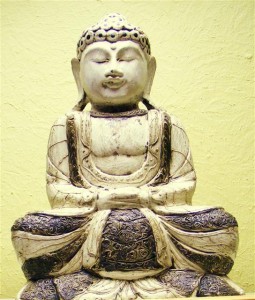Buddhism
It may seem strange to include Buddhism under the heading of Pagan but there is a contention that as Buddhists do not worship one of the recognised ‘traditional’ gods, indeed they do not worship a god, and is also very earth linked that it should be classed as Pagan. Buddhism began around 500BC with the birth of Siddhartha Gotama, the Buddha, who reached enlightenment at the age of 35.
Buddhism is the path of practice and spiritual development ultimately leading to a state of Buddhahood or total enlightenment. The name comes from the word ‘budhi’ that means ‘to awaken’. Through such practises as meditation self-awareness is acquired and the development of kindness, wisdom and awareness. The basic principles are simple and teach such things as the awareness of every action having a consequence and that nothing is permanent there can always be change. These principles have the ability to be applied irrespective of race or creed and in many ways. Whilst there are many different styles of Buddhism there is a common set of principles of lack of dogma, non-violence, tolerance of differences and generally some form of meditation.
There are more than 350 million Buddhists in the world and the number is increasing particularly in the West. Much of the belief structure of what is often called New Age beliefs align with Buddhism.

Buddhism
It may seem strange to include Buddhism under the heading of Pagan but there is a contention that as Buddhists do not worship one of the recognised ‘traditional’ gods, indeed they do not worship a god, and is also very earth linked that it should be classed as Pagan. Buddhism began around 500BC with the birth of Siddhartha Gotama, the Buddha, who reached enlightenment at the age of 35.
Buddhism is the path of practice and spiritual development ultimately leading to a state of Buddhahood or total enlightenment. The name comes from the word ‘budhi’ that means ‘to awaken’. Through such practises as meditation self-awareness is acquired and the development of kindness, wisdom and awareness. The basic principles are simple and teach such things as the awareness of every action having a consequence and that nothing is permanent there can always be change. These principles have the ability to be applied irrespective of race or creed and in many ways. Whilst there are many different styles of Buddhism there is a common set of principles of lack of dogma, non-violence, tolerance of differences and generally some form of meditation. There are more than 350 million Buddhists in the world and the number is increasing particularly in the West. Much of the belief structure of what is often called New Age beliefs align with Buddhism.

t may seem strange to include Buddhism under the heading of Pagan but there is a contention that as Buddhists do not worship one of the recognised ‘traditional’ gods, indeed they do not worship a god, and is also very earth linked that it should be classed as Pagan. Buddhism began around 500BC with the birth of Siddhartha Gotama, the Buddha, who reached enlightenment at the age of 35.
Buddhism is the path of practice and spiritual development ultimately leading to a state of Buddhahood or total enlightenment. The name comes from the word ‘budhi’ that means ‘to awaken’. Through such practises as meditation self-awareness is acquired and the development of kindness, wisdom and awareness. The basic principles are simple and teach such things as the awareness of every action having a consequence and that nothing is permanent there can always be change. These principles have the ability to be applied irrespective of race or creed and in many ways. Whilst there are many different styles of Buddhism there is a common set of principles of lack of dogma, non-violence, tolerance of differences and generally some form of meditation. There are more than 350 million Buddhists in the world and the number is increasing particularly in the West. Much of the belief structure of what is often called New Age beliefs align with Buddhism.
